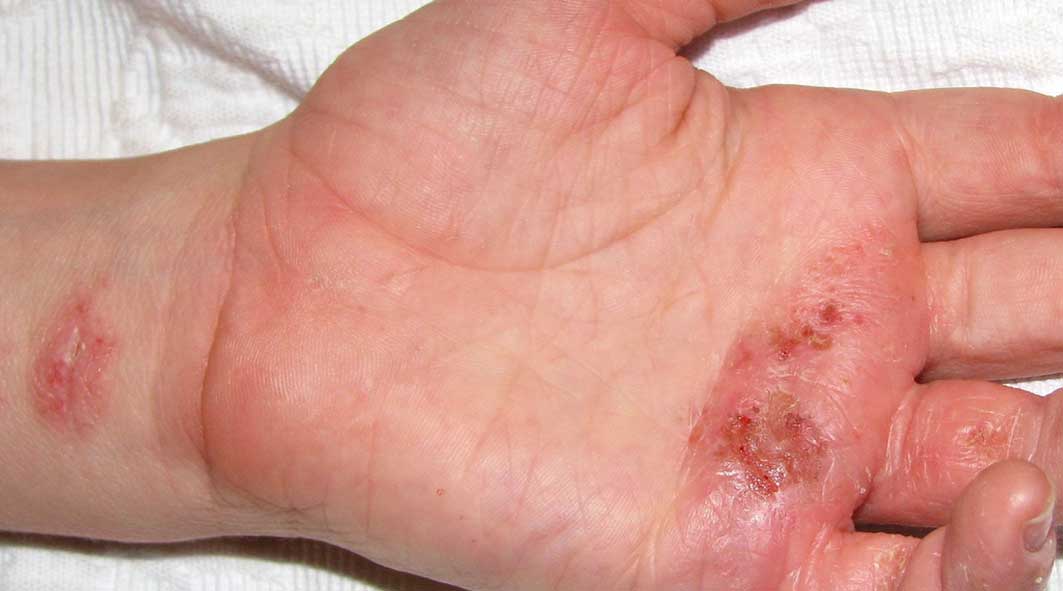Eczema is a term for different types of skin inflammation (dermatitis). The symptoms of eczema commonly include itchy, reddened, dry skin. Many things can cause this type of skin irritation such as dryness, soaps and detergents, cleaning products, rubber gloves, and even cosmetic lotions and creams. Since the skin is itchy, prolonged scratching often occurs which in turn leads to reddened, irritated, scaling skin or to a leathery thickening of the skin (sometimes called lichenification). Cracking and weeping of the skin may also occur and open sores may become infected.
The causes of eczema have not been fully determined. Allergies, stress, irritants, and genetic factors are all believed to be related to the development of this condition. The tendency to have skin reactions like this often runs in families. People with eczema involving their hands may also have symptoms of asthma, food allergies, or hay fever.
What is eczema?
Eczema is a general term for many types of skin inflammation, also known as dermatitis. The most common form of eczema is atopic dermatitis (some people use these two terms interchangeably). However, there are many different forms of eczema.
Eczema can affect people of any age, although the condition is most common in infants, and about 85% of people have an onset prior to 5 years of age. Eczema will permanently resolve by age 3 in about half of affected infants. In others, the condition tends to recur throughout life. People with eczema often have a family history of the condition or a family history of other allergic conditions, such as asthma or hay fever. Up to 20% of children and 1%-2% of adults are believed to have eczema. Eczema is slightly more common in girls than in boys. It occurs in people of all races.
Eczema is not contagious, but since it is believed to be at least partially inherited, it is not uncommon to find members of the same family affected.
What are the causes of eczema?
Doctors do not know the exact cause of eczema, but a defect of the skin that impairs its function as a barrier, possibly combined with an abnormal function of the immune system, is believed to be an important factor. Studies have shown that in people with atopic dermatitis, there are gene defects that lead to abnormalities in certain proteins (such as filaggrin) that are important in maintaining the barrier of normal skin.
Some forms of eczema can be triggered by substances that come in contact with the skin, such as soaps, cosmetics, clothing, detergents, jewelry, or sweat. Environmental allergens (substances that cause allergic reactions) may also cause outbreaks of eczema. Changes in temperature or humidity, or even psychological stress, can lead to outbreaks of eczema in some people.
What are the symptoms of eczema?
Eczema most commonly causes dry, reddened skin that itches or burns, although the appearance of eczema varies from person to person and varies according to the specific type of eczema. Intense itching is generally the first symptom in most people with eczema. Sometimes, eczema may lead to blisters and oozing lesions, but eczema can also result in dry and scaly skin. Repeated scratching may lead to thickened, crusty skin.
While any region of the body may be affected by eczema, in children and adults, eczema typically occurs on the face, neck, and the insides of the elbows, knees, and ankles. In infants, eczema typically occurs on the forehead, cheeks, forearms, legs, scalp, and neck.
Eczema can sometimes occur as a brief reaction that only leads to symptoms for a few hours or days, but in other cases, the symptoms persist over a longer time and are referred to as chronic dermatitis.
what is eczema?
Eczema is a term for different types of skin inflammation (dermatitis). The symptoms of eczema commonly include itchy, reddened, dry skin. Many things can cause this type of skin irritation such as dryness, soaps and detergents, cleaning products, rubber gloves, and even cosmetic lotions and creams. Since the skin is itchy, prolonged scratching often occurs which in turn leads to reddened, irritated, scaling skin or to a leathery thickening of the skin (sometimes called lichenification). Cracking and weeping of the skin may also occur and open sores may become infected.
The causes of eczema have not been fully determined. Allergies, stress, irritants, and genetic factors are all believed to be related to the development of this condition. The tendency to have skin reactions like this often runs in families. People with eczema involving their hands may also have symptoms of asthma, food allergies, or hay fever.
What is eczema?
Eczema is a general term for many types of skin inflammation, also known as dermatitis. The most common form of eczema is atopic dermatitis (some people use these two terms interchangeably). However, there are many different forms of eczema.
Eczema can affect people of any age, although the condition is most common in infants, and about 85% of people have an onset prior to 5 years of age. Eczema will permanently resolve by age 3 in about half of affected infants. In others, the condition tends to recur throughout life. People with eczema often have a family history of the condition or a family history of other allergic conditions, such as asthma or hay fever. Up to 20% of children and 1%-2% of adults are believed to have eczema. Eczema is slightly more common in girls than in boys. It occurs in people of all races.
Eczema is not contagious, but since it is believed to be at least partially inherited, it is not uncommon to find members of the same family affected.
What are the causes of eczema?
Doctors do not know the exact cause of eczema, but a defect of the skin that impairs its function as a barrier, possibly combined with an abnormal function of the immune system, is believed to be an important factor. Studies have shown that in people with atopic dermatitis, there are gene defects that lead to abnormalities in certain proteins (such as filaggrin) that are important in maintaining the barrier of normal skin.
Some forms of eczema can be triggered by substances that come in contact with the skin, such as soaps, cosmetics, clothing, detergents, jewelry, or sweat. Environmental allergens (substances that cause allergic reactions) may also cause outbreaks of eczema. Changes in temperature or humidity, or even psychological stress, can lead to outbreaks of eczema in some people.
What are the symptoms of eczema?
Eczema most commonly causes dry, reddened skin that itches or burns, although the appearance of eczema varies from person to person and varies according to the specific type of eczema. Intense itching is generally the first symptom in most people with eczema. Sometimes, eczema may lead to blisters and oozing lesions, but eczema can also result in dry and scaly skin. Repeated scratching may lead to thickened, crusty skin.
While any region of the body may be affected by eczema, in children and adults, eczema typically occurs on the face, neck, and the insides of the elbows, knees, and ankles. In infants, eczema typically occurs on the forehead, cheeks, forearms, legs, scalp, and neck.
Eczema can sometimes occur as a brief reaction that only leads to symptoms for a few hours or days, but in other cases, the symptoms persist over a longer time and are referred to as chronic dermatitis.
 Parsi Teb Physical and Mental Health Journal
Parsi Teb Physical and Mental Health Journal 

![RF [Radiofrequency treatment] (Part II)](https://en.parsiteb.com/wp-content/uploads/2019/08/parsi_teb-RF-Radiofrequency_treatment_2-310x165.jpg)

